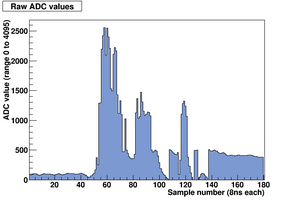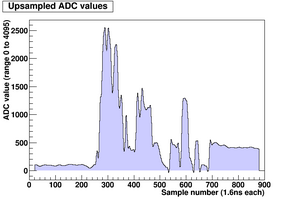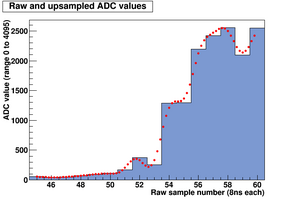CDC run 1280 bad events
Below are the original sample values followed by the upsampled values for that same time, and then at 4 time-steps of 1.6ns later (calculated in C++, floating point arith). The first upsampled value should match the original value +/- 1. Clearly something is wrong here, first with the original data (contains discontinuities) and then with the upsampled data.
sample: 45 original: 57 upsampled: 57 54 50 48 46 sample: 46 original: 44 upsampled: 45 44 45 46 49 sample: 47 original: 51 upsampled: 51 55 59 63 67 sample: 48 original: 71 upsampled: 72 76 81 86 92 sample: 49 original: 94 upsampled: 98 103 107 110 110 sample: 50 original: 117 upsampled: 108 107 113 130 162 sample: 51 original: 174 upsampled: 207 260 311 346 353 sample: 52 original: 375 upsampled: 331 287 241 220 245 sample: 53 original: 257 upsampled: 334 485 680 889 1075 sample: 54 original: 1287 upsampled: 1212 1289 1316 1316 1323 sample: 55 original: 1294 upsampled: 1365 1458 1602 1780 1962 sample: 56 original: 2196 upsampled: 2126 2254 2342 2399 2436 sample: 57 original: 2423 upsampled: 2469 2502 2534 2552 2542
Used C++ version of the integer arithmetic that is used in the VHDL code
C++ leading edge algo output: Searching for ADC value >= 300, ADC values surrounding the threshold crossing are ADC[41] 108 ADC[42] 98 ADC[43] 89 ADC[44] 77 ADC[45] 57 ADC[46] 44 ADC[47] 51 ADC[48] 71 ADC[49] 94 ADC[50] 117 ADC[51] 174 ADC[52] 375 Subset of ADC values sent to the upsampling routine: adc_subset[0] 89 adc_subset[1] 77 adc_subset[2] 57 ... adc_subset[9] 375 adc_subset[10] 257 adc_subset[11] 1287 ... up to adc_subset[14] 2423 thresholds: hi 231 lo 111 threshold 231 met or exceeded by sample 9 value 375 adc[8] 174 adc[7] 117 adc[6] 94 threshold 111 met or preceded by sample 6 value 94 itime1 60 x 0.1 samplesThe low timing threshold is now known to be between samples 6 and 7, so upsampled points are calculated from 5.8 to 7.2. These are searched from the last point back to the first, looking for a value which matches or is lower than the low timing threshold (111).
The next stage in the calculation is to interpolate between the two points surrounding the threshold crossing but in this case the first point (upsampled 7) was less than the threshold, it all goes horribly wrong.upsampled 0 91 upsampled 1 97 upsampled 2 102 upsampled 3 107 upsampled 4 110 upsampled 5 109 upsampled 6 107 upsampled 7 107
threshold 111 met or preceded by upsampled point 7 value 107 itime2 14 x 0.1 samples
denom -107 limit 8
Upsampled values 1 (97) and 6 (107) should match the raw values for samples 6 (94) and 7 (117), respectively. They do not, as can be seen in the plot at the top of the page.
VHDL simulation output: at 308 ns(1): Note: upsampled: iubuf(0) 91 (/findtime_tb/uut/). at 460 ns(1): Note: upsampled: iubuf(1) 97 (/findtime_tb/uut/). at 612 ns(1): Note: upsampled: iubuf(2) 102 (/findtime_tb/uut/). at 748 ns(1): Note: upsampled: iubuf(3) 107 (/findtime_tb/uut/). at 884 ns(1): Note: upsampled: iubuf(4) 110 (/findtime_tb/uut/). at 1036 ns(1): Note: upsampled: iubuf(5) 109 (/findtime_tb/uut/). at 1188 ns(1): Note: upsampled: iubuf(6) 107 (/findtime_tb/uut/). at 1340 ns(1): Note: upsampled: iubuf(7) 107 (/findtime_tb/uut/). at 1348 ns(1): Note: i 7 adc val 107 lo thres 111 (/findtime_tb/uut/). at 1348 ns(1): Note: adc_sample_lo2 7 (/findtime_tb/uut/). at 1348 ns(1): Note: itime2 14 x 0.1samples (/findtime_tb/uut/). at 1356 ns(1): Note: denom -107 (/findtime_tb/uut/). at 1356 ns(1): Note: limit 8 (/findtime_tb/uut/). at 1364 ns(1): Note: sum -107 ifrac 1 (/findtime_tb/uut/). at 1372 ns(1): Note: sum -214 ifrac 2 (/findtime_tb/uut/). at 1380 ns(1): Note: sum -321 ifrac 3 (/findtime_tb/uut/). at 1388 ns(1): Note: sum -428 ifrac 4 (/findtime_tb/uut/).
The good news is that the VHDL and C++ codes give the same results before VHDL descends into a spiral of doom.
The fix for the bug would be to test


